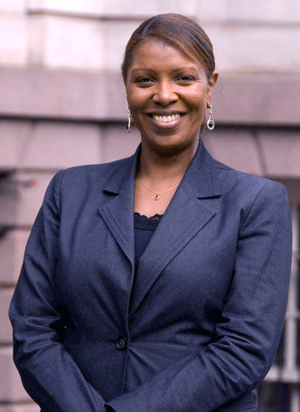
BY GERARD FLYNN | Signaling what may be the beginning of a left-leaning trend in city government, Brooklyn Councilwoman Letitia “Tish” James easily defeated state Senator Daniel Squadron in the Democratic runoff election for public advocate Tuesday night.
In a bitterly fought campaign, James took close to 60 percent of the vote. With no Republican opposing her in the November election, she is expected to be the first woman of color to hold citywide office, and will take over the position from mayoral candidate and close friend Bill de Blasio.
On Tuesday evening, a tearful James thanked her supporters and promised as public advocate to be a strong voice for the city’s underserved. She also used her acceptance speech to criticize congressional Republicans, as well as the New York Police Department’s policies of “stop-and-frisk” and its controversial surveillance program targeting Muslims. To raucous cheers and applause, she declared to the jubilant crowd, “We don’t need any more Bloombergs!”
Squadron — whom James accused of being too close to Bloomberg and real estate interests — in a statement, congratulated James on her win.
“She’ll be a great advocate for New Yorkers without a voice, without high-powered lobbyists, without City Hall on speed dial,” he said.
The office of public advocate, created in 1993, acts mainly as an ombudsman for citizen complaints or watchdog on wrongdoing. While it can play a role in shaping government policy, the office has very limited powers.
In addition to being second in line to the mayor, the public advocate can introduce legislation and has powers of appointment to some city agencies. It can also influence City planning, the budget process and the management of retirement funds. The advocate, however, cannot vote in the City Council.
Perhaps more importantly, the position is also seen as a springboard to higher office, which may explain why Senator Squadron spent more than $3 million on his campaign for an office with a budget of $2 million. Of the three former office holders, two, Mark Green and of course de Blasio, have pursued mayoral ambitions while in office.
In addition to drawing blank stares from many members of the public when asked to name the current public advocate, the race drew little media attention — until the runoff election.
In recent days, the runoff contest’s $13 million price tag drew calls for reform, as The New York Times recently reported. Instead of holding costly, low-turnout runoffs, New York City should switch to instant runoff voting, the Times reported critics as urging.
An instant runoff is based on voters being asked to rank the candidates in the primary election. The Times reported that in some cities, if no candidate surpasses the minimum threshold of 40 percent required to win an election outright, “the last-place finisher is eliminated, and those votes are redistributed according to the preferences on the ballots. The process continues until a candidate crosses the threshold.”
While James was heavily backed by organized labor, and opposed the extension of terms limits and the controversial Atlantic Yards development project, Queens state Senator Tony Avella endorsed Squadron in the race.
A longtime critic of the often-close ties between real estate developers and city politicians, “progressive” and otherwise, Avella said the progressive brand has been a calculated hallmark of citywide elections this season.
He expressed doubts that James’s populist rhetoric reflects little more than a “good, manufactured image” and does not follow with her voting records in the City Council.
Avella said he found Squadron to be “more transparent” and an advocate of good government and affordable housing.
“In the City Council, when myself and Charles Barron would oppose some of the city’s projects because of no affordable housing component, she would get up and say it’s no good, then vote the other way,” Avella charged.
Despite the leftist tone at Tuesday night’s celebrations, concerns that a left-leaning de Blasio victory on the heels of last night’s news may run the rich out of the city were unfounded, said supporter Alan Schulkin.
Calling James’s color and gender a “major influence” in her victory following Christine Quinn’s defeat, he said James and de Blasio are “too smart” to be tagged with the “class warfare” label.
“While having leftist tendencies, they are not extreme left wing and will work to keep this tax base in the city,” Schulkin said.
Standing outside the West Side club where James’s runoff party was being held, as supporters celebrated inside, Corey Johnson, who is set to take office as a new addition to the City Council, echoed Schulkin’s views.
James’s victory followed by a de Blasio one in November will not, Johnson said, panic the rich and send them running out of the city.
A de Blasio win in November, Johnson said, following on the heels of James’s win would be a good result for “ascendant progressive views.”
He said that he is excited by her victory and looks forward to a city with candidates advocating for affordable housing and improving the lives of the working class.

































